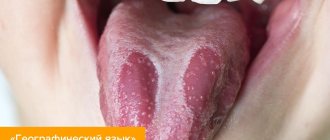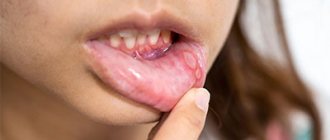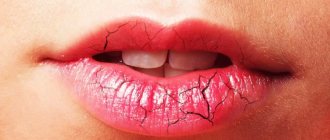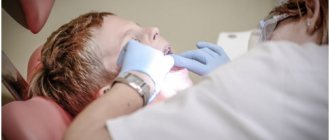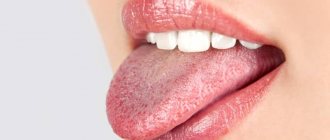- Symptoms of itching and burning
- Causes of dry and burning nose
- What complications can it lead to?
- Which doctor should I contact?
- Diagnostics
- How to get rid of unpleasant symptoms
- Treatment
A burning or itching sensation in the nose causes great discomfort.
This causes breathing problems, sneezing attacks, and makes it difficult to concentrate at work or relax. Often these manifestations are accompanied by lacrimation (especially after a bout of sneezing) or dryness in the nasal passages, which is aggravated by the appearance of crusts and difficulty breathing through the nose.
Itching and burning in the nose are not always harmless. They accompany respiratory diseases, allergies, and may indicate other serious pathologies.
Symptoms of itching and burning
If the burning and itching do not go away on their own within a few days, then they signal the onset of some disease. The following pathologies manifest themselves as burning or itching:
- Rhinitis/sinusitis. With rhinitis, the nasal mucosa most often suffers. Regardless of how it becomes deformed (swells, grows, atrophies), difficulties arise with the passage of air through the nasal passages. The mucus is difficult to remove, and the surface of the mucous membrane dries out.
- Scleroma. If dry mucous membranes are combined with nasal congestion, we can talk about a dangerous infectious disease - scleroma. The disease is characterized by the formation of scar tissue against the background of mucosal atrophy. The risk of scleroma is a severe course and rare more serious complications.
- Diabetes. The mucous membranes work with disturbances in diabetes mellitus. Dryness may spread to the salivary glands.
- Hormonal imbalances. Itching and burning in the nose sometimes occurs during pregnancy or in old age.
An itchy nose is often accompanied by secondary symptoms. Mucous discharge appears and dried crusts come off. With a cold - headache, fever, cough, runny nose, redness of the mucous membranes, rashes on the skin around the nose.
Causes of the symptom
As already mentioned, the most common cause of itching during urination is infection. Pathogenic microorganisms penetrate the mucous membranes and cause an inflammatory process. Increased pain during urine output can be explained by the effect of the liquid on the receptors of inflamed tissues. At the same time, often unpleasant sensations do not go away after urination and torment a person for a long time.
Possible causes of dysuria:
- Urolithiasis, characterized by the formation of stones in the bladder or urethra. Hard structures irritate the mucous membrane of organs during the movement of urine and cause inflammation. A common sign of this disease is the appearance of blood in the urine.
- Kidney stones are the formation of stones in the kidneys. Stones from the kidney tissue can also travel to the underlying parts of the excretory system and cause blockage of the tract.
- Infectious or non-infectious inflammation of the bladder (cystitis).
- An abnormal narrowing of the urethra, making it difficult for urine to flow.
- Sexually transmitted diseases affecting the urogenital tract.
- Inflammation of the prostate gland in men, manifested by tissue swelling and compression of the urethra.
- Oncological diseases. Dysuria occurs with the growth of malignant neoplasms of the prostate and bladder.
- Inflammation of the kidney tubules due to a bacterial or viral infection (pyelonephritis).
- Gynecological diseases in women. First of all, this is vaginitis, in which inflammation can spread to the tissue of the urethra.
If the doctor's examination fails to detect the specific disease causing the pain, additional factors are considered. Dysuria often occurs due to poor nutrition or other features of a person’s lifestyle.
Causes of dry and burning nose
In addition to the symptoms of the disease, dry nasal mucosa develops for a number of external reasons:
- Dry air during the heating season causes dry mucous membranes.
- Allergies to pet hair, house dust, pollen, and chemicals cause itching in the nose, swelling of the mucous membrane, and lacrimation.
- Excessive use of vasoconstrictor medications or folk remedies in the treatment of a runny nose provokes dryness, burning and pain in the nose.
- Polyps inside the nose, deviated nasal septum, herpes, foreign objects inside the nasal passage - all this causes unpleasant sensations without a runny nose and drying out of the mucous membrane.
Complications
Bacteria, viruses and fungi can cause an acute infection that quickly spreads to nearby organs. So, in the case of urethritis and cystitis, an ascending infection affecting the kidney tissue is possible. The negative consequences of such a disease can threaten the patient's life.
Dangerous complications of diseases that cause dysuria:
- Purulent lesion of renal tissue.
- Severe renal failure due to chronic infection.
- Pregnancy disorders in women.
- Penetration of pathogenic microorganisms into the bloodstream with the development of sepsis.
Thus, burning when urinating is not a harmless symptom. Diseases of the genitourinary system that cause dysuria can lead to serious complications. Urological examination allows for timely therapeutic or surgical treatment.
What complications can it lead to?
With proper therapy, the condition of dryness and burning of the nasal mucosa can be eliminated within a few days.
It is not recommended to self-medicate without knowing the cause of the ailment. If the burning sensation in the nose is caused by chronic rhinitis, in which the mucous membrane becomes thinner or thicker and an unpleasant odor appears, it is necessary to undergo comprehensive treatment under the supervision of a doctor. Otherwise, the person’s condition will only worsen: fatigue will increase, the quality of sleep will deteriorate, and snoring will appear.
Being the cause of itching in the nose, allergies can lead to damage to the bronchi and, in particular, bronchial asthma.
A constant feeling of tension with difficulty breathing causes nervousness, mental instability, and stress. This, in turn, leads to psychosomatic disorders and hormonal disorders.
Diagnostics
The specialist makes a diagnosis based on the patient’s complaints. At the appointment, it is necessary to inform about how the symptoms appeared, characterize the painful sensations and indicate their duration.
To make a diagnosis, it is important to know what medications the patient is taking, what his living and working conditions are, and whether he has recently experienced stress. It is imperative to name the chronic diseases that the patient suffers from or the tendency to allergic reactions.
To confirm the diagnosis, blood and hormonal tests are prescribed. Sowing of secretions or dermatoscopy (method of examining the surface of the skin and mucous membranes) is performed.
The doctor's attention will be drawn to enlarged lymph nodes, as well as the condition of the liver, spleen and thyroid gland.
Diagnosis and treatment
If you consult a specialist with complaints of burning in the joints, the doctor will evaluate all other symptoms and medical history, and, based on the data received, will choose an individual diagnostic regimen. In any case, you will most likely need to have an x-ray of the joint, an ultrasound, and several laboratory tests. If a spinal lesion is suspected, an MRI may be ordered, and specific blood tests will be needed to diagnose systemic diseases.
If you have any questions, ask our specialist! Ask a Question
No one will specifically treat the burning sensation in the joints. Treatment will, of course, be aimed at the underlying disease, which will be determined after a thorough diagnosis. To reduce the inflammatory process and alleviate the patient's condition, non-steroidal anti-inflammatory drugs, classical analgesics and, of course, many physiotherapeutic techniques can be used. Particularly effective in this case:
- local exposure to ultrasound;
- magnetic therapy;
- pharmacopuncture.
Sign up at the MART medical center in St. Petersburg (see map) by calling 8 or leave a request on the website.
How to get rid of unpleasant symptoms
Both before diagnosis and during treatment, you can rinse your nose with preparations based on sea water or use drops with silver ions to cleanse the mucous membrane and relieve the feeling of itching or burning of the mucous membrane.
An important point in the treatment of respiratory diseases is maintaining the required level of humidity and cleanliness of indoor air. The house must be regularly wet cleaned and dust must not accumulate. It is important that during the heating season the air humidity in the house or apartment is 40-60%.
Hardening, maintaining immunity, rules of personal hygiene, taking care of a balanced diet, combating physical inactivity and the absence of bad habits will create strong protection against damage to the nasal mucosa.
It is necessary to be attentive to the treatment of diseases of the upper respiratory tract and take care of respiratory protection when working with hazardous substances.
Burning behind the sternum
Gastritis
Ulcer
Pancreatitis
34673 May 28
IMPORTANT!
The information in this section cannot be used for self-diagnosis and self-treatment.
In case of pain or other exacerbation of the disease, diagnostic tests should be prescribed only by the attending physician. To make a diagnosis and properly prescribe treatment, you should contact your doctor. Burning sensation behind the sternum: causes of occurrence, what diseases it occurs with, diagnosis and treatment methods.
Definition
A burning sensation behind the sternum is a symptom characteristic of many diseases - this is how patients with pathologies of the cardiovascular system, spine, gastrointestinal tract, respiratory system, neuralgia and panic attacks describe their sensations.
In some cases, this symptom is not dangerous, but some pathological conditions require immediate medical attention.
Types of burning behind the sternum
There is no generally accepted classification of burning behind the sternum. When patients are asked about their sensations, they talk about pressing, pulling, stabbing, burning, and encircling pain.
Thus, the burning sensation is as varied as the causes that cause it.
Possible causes of burning behind the sternum
Burning in the sternum, a feeling of fullness and heaviness, especially in older people, can be a symptom of serious cardiac problems, and all of them equally require seeking medical help.
In diseases of the gastrointestinal tract, the burning sensation is usually diffuse, often radiating to the back. In many patients it occurs during or after eating.
Disruption of the musculoskeletal system often leads to unpleasant sensations in the chest. The burning sensation intensifies when inhaling or exhaling, and changes when changing body position.
Osteochondrosis of the thoracic spine can cause numbness in the hands and decreased sensitivity.
Neuroses and panic attacks are often accompanied by a burning sensation in the chest.
When the neuroendocrine regulation of internal organs is disrupted, patients complain of a burning sensation behind the sternum. The cause may be either insufficient maturity of the body's systems during adolescence, or previous infectious diseases, stress, bad habits, or overwork. Short-term vasospasm directly leads to the appearance of unpleasant sensations in the heart area. The attacks pass at rest and are accompanied by weakness, rapid heartbeat, and cold hands due to deterioration of blood flow.
Diseases leading to a burning sensation behind the sternum
Cardiovascular pathologies:
- Angina pectoris. Impaired blood circulation in the vessels of the heart due to atherosclerosis leads to deterioration in the nutrition of the heart muscle. During physical activity or anxiety, the heart requires more oxygen - if there is not enough oxygen, then the first signal will be discomfort in the chest area. A burning sensation, a feeling of squeezing, a tingling sensation can radiate (radiate) to the left arm, under the shoulder blade, rarely to the lower jaw, lasting no more than 15 minutes and passing with rest and after taking nitroglycerin.
- Myocardial infarction.
During a heart attack, a sharp disruption of the blood supply to the heart muscle occurs due to blockage of most of the lumen of the vessel supplying the heart by thrombotic masses. Most often, intense pain occurs, but a strong burning sensation in the chest may also be present. The attack lasts a long time, is not relieved by nitroglycerin, does not go away with rest, and is accompanied by shortness of breath, severe weakness, and decreased vision. Myocardial infarction is a life-threatening condition, so the patient needs urgent hospitalization. - A sharp rise in blood pressure may occur with a burning sensation in the chest. During a hypertensive crisis, the patient feels weakness, headache, dizziness, nausea, spots appear before the eyes and tinnitus.
- Inflammatory processes in the heart can also be manifested by a burning sensation in the chest. Typically, this condition is preceded by an infectious disease, most often of viral origin, or a severe bruise in the chest area. Unpleasant sensations can spread to the right or left side and intensify with changes in body position.
- A very dangerous condition is pulmonary embolism.
It occurs if blood clots are present in the vessels of the lower extremities - when they break off, they rise up the bloodstream and clog the pulmonary vessels. In addition to a burning sensation behind the sternum, the patient is bothered by severe shortness of breath, coughing (sometimes with blood), and severe cyanosis appears. In such a situation, emergency hospitalization is necessary. At risk are patients with varicose veins, smokers, and patients on the first day after surgery.
Diseases of the gastrointestinal tract:
- Esophageal pathology is considered perhaps the most common cause of burning in the chest. It occurs as a result of the reflux of acidic gastric contents into the esophagus, which leads to damage to its mucous membrane. A burning sensation appears after eating food (especially spicy, fatty, smoked and fried), when wearing tight belts and taking a horizontal position immediately after eating.
- Inflammatory processes in the pancreas and gall bladder are often accompanied by a burning sensation in the chest. This symptom appears a couple of hours after eating and may be accompanied by nausea and heaviness in the stomach.
Respiratory diseases:
In case of inflammation of the bronchi or lungs (bronchitis, pneumonia, pleurisy), in addition to coughing and fever, the patient may be bothered by a burning sensation in the chest.
In addition, diseases characterized by a burning sensation behind the sternum include intercostal neuralgia, osteochondrosis, intercostal myositis, and vegetative-vascular dystonia.
Which doctors should I contact if I have a burning sensation in the chest?
If a burning sensation behind the sternum is accompanied by a sharp deterioration in condition, weakness, an increase in pain, shortness of breath, coughing, or dizziness, you must immediately call an ambulance.
In other cases, you should also not postpone your visit to the doctor. Since this symptom has many causes, it is advisable to first turn to. He will prescribe examinations and, if necessary, refer to other specialists: a cardiologist; gastroenterologist; pulmonologist; neurologist.
Diagnosis and examinations for burning sensation behind the sternum
Making a diagnosis begins with a thorough history taking into account all the patient’s complaints and a physical examination.
To exclude cardiovascular pathology, first of all, a chest x-ray or CT scan of the chest and mediastinum is performed, as well as an electrocardiographic study (ECG) or echocardiography (EchoCG).
Treatment
Getting rid of unpleasant sensations in the nose depends on how accurately their cause is determined.
If the cause of the itching is an allergy, then eliminating the source of the reaction will be the first step in treatment. Next, antihistamines are used and a special diet is prescribed. It is useful to rinse your nose with sea salt solutions. Corticosteroids are used in the most extreme cases and only as prescribed by a doctor.
If the cause of mucosal damage is a fungal infection, the otolaryngologist prescribes antifungal nasal and tablet medications.
To treat viral infections, the doctor prescribes local antiviral drugs in complex therapy. Bacterial infections are treated according to a similar principle.
Treatment for vaginal itching
The main method is medication.
Important! Only a gynecologist can prescribe treatment. Without an appropriate prescription, you should not take any measures, as this may aggravate the situation.
Drug treatment for itching of the labia involves taking prescribed medications. When it comes to infectious diseases, most often the doctor prescribes antifungal and antibacterial agents. Usually these are various tablets and suppositories in the vagina.
If we are talking about dysbiosis, then the gynecologist prescribes probiotics and prebiotics, and, if necessary, prescribes a diet.
Important! If the cause of burning in the vagina is an STD, then both partners need to be treated. In this case, antifungal drugs are usually prescribed, as well as a course of antibiotics.
If a burning sensation appears as a result of age-related changes, the gynecologist will recommend a special hygiene cream.

